 |
| |
e-newsletter of the Centre for Environment Education |
|
|
 |
| July 1 -15, 2013 |
|
 |
|
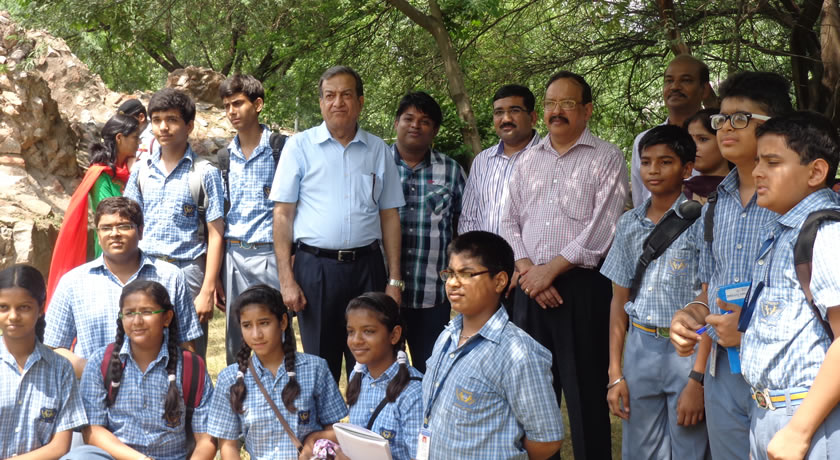 |
| Around 250 students from more than 20 schools across the Delhi National Capital Region (NCR) participated in this drive. |
 |
|
| A Plantation Drive at Children’s Museum |
|
Archaeological Survey of India (ASI) in partnership with CEE, organized a Plantation Drive for school students at the Children's Museum at Siri Fort Garden Area on July 5. Along with the plantation drive the students were given insights on the various aspects of ASI. This event aimed at raising awareness and sensitizing school students on various issues related to Environment and the Indian Culture and Heritage.
Mr. Praveen Shrivastava, Director General, ASI was the chief guest at the event and he inaugurated the event by lighting-up the lamp. The other dignitaries who shared the dais with Mr. Shrivastava were Dr. B.R. Mani, Additional Director General, ASI; Dr. S.D. Singh, CEO Parks and Garden Society, Government of Delhi; Mr. Vasant Kumar Swarankar, Superintendent Archaeologist, Delhi circle, ASI; Mr. Anil Arora, Senior Project Officer, CEE; Dr. Gopinath, Deputy Conservator of Forests (DCF), Delhi; and Ms. Ranu Kulshreshtha, Head CSR, Moser Baer.
A workshop on bird nest-making was also organized with the support from Eco Roots Foundation. |
 |
|
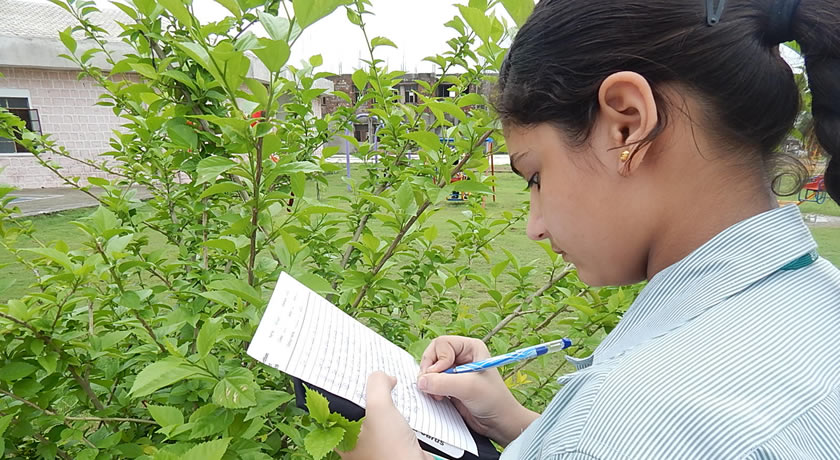 |
| Survey sheets helped to focus observations along the nature trail. |
 |
|
| Celebrating the World Population Day at Jhalawar, Rajasthan |
|
Eco-club members of Lady Anusuiya Singhania Educational Centre organized a nature exploration and a plantation drive on July 11 to celebrate the World Population Day. This was done to initiate a district-level Van Mahotsava programme at Jhalawar under National Green Corps programme. The CEE Jaipur team was invited by the District Coordinator, Mr. Giriraj Garg to facilitate the event and to orgnanise a nature trail.
After debriefing, a flora survey sheet was provided to the participants to record their observations during the trail. Students were then asked to create a plan based on their choice for plantation in the school campus. This provided an opportunity for exploring the immense floral diversity and the associated fauna, their vital role for sustaining life and how human activities are adversely affecting their survival. |
 |
|
| Vermicomposting Training for Prerna Gaon Residents |
Sustaining Urban Sustainability (SUS) programme is an initiative of the Swedish International Centre of Education for Sustainable Development (SWEDESD). In India, it is managed jointly by CEE, SWEDESD, and International Council for Local Environmental Initiatives (ICLEI), and is facilitated by CEE. The SUS program is being implemented in three countries Bangladesh, Bhutan and India. In India, the programme is spread across 7 cities. The hill city of Gangtok, capital of Sikkim, is one of the 7 cities.
The SUS Gangtok programme aims at adopting a decentralized and an environment-friendly approach to solid waste management. A pilot project on Zero Waste was initiated on May 25 at Prerna Gaon, Daragaon Ward.
As part of this initiative, a training programme on vermicomposting for residents of Prerna Gaon of Gangtok Municipality was undertaken by the Zero Waste Himalayas (ZWH) Group on July 15. Residents of Prerna Gaon led by the members of Prena Gaon Vikas Sanstha (PGVS) had been demanding the extension of services of municipality garbage vehicles to their area. To support this effort the PGVS had requested the ZWH group to conduct training on composting so that those residents who were interested could do their own composting at home.
Around 35 residents attended the training which was conducted by Mr. Roshan Rai of NGO DLR Prerna of Darjeeling and a member of the ZWH Group. The meeting was also attended by the Deputy Mayor Gangtok Municipality Mr. Sangay G Bhutia and representatives of WWF India, Sikkim.
Mr. Rai explained in simple terms the principles of composting and vermincomposting, the dos and don’ts, and the key points for successful vermincomposting based on his personal and collective experience in the Darjeeling Municipality.
All this would go a long way to make Prerna Gaon a model for other areas to emulate. The GMC and the Ward Councilor Mr. Bhaskar Basnett are actively engaged in locating a suitable area for setting up a Resource Recovery Centre for the waste generated at Daragaon. In the days to come it is hoped that the residents of Prerna Gaon would successfully implement waste segregation at household level and the practice would be replicated in other areas of the ward. |
 |
|
|
|
|
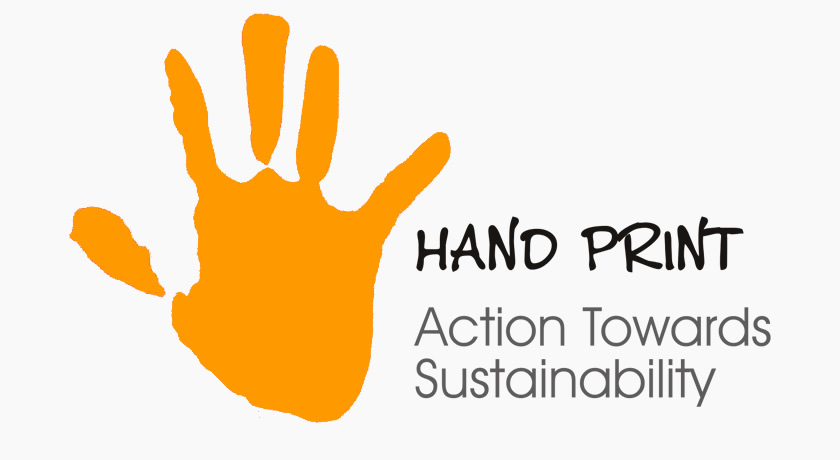 |
| |
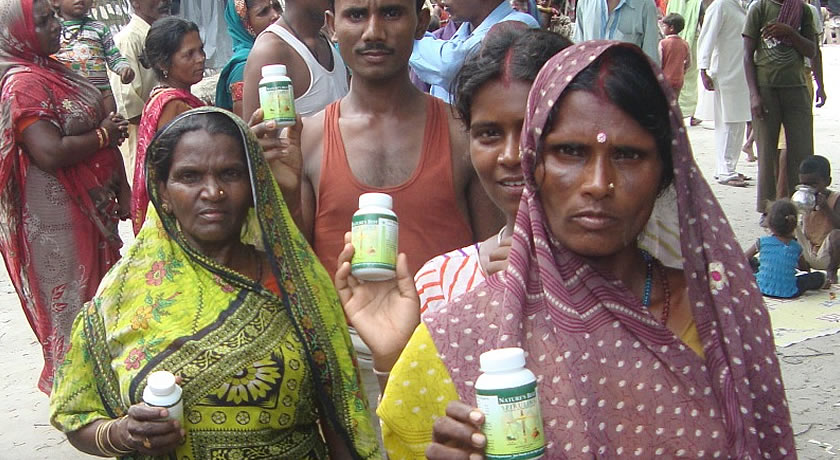 |
|
Forty flood affected families received Spirulina tablets |
 |
|
| Spirulina to the Rescue in Ravaged Uttarakhand |
|
The unprecedented Uttarakhand tragedy was of very high magnitude, and the toll on life and property has been huge. Besides the loss of standing crops, the fields have got deposited with thick layer of silt.The land, water sources, and wetlands have been destroyed and degraded; and plant and animal wealth have suffered heavy losses. Infrastructure has been badly destroyed. Even today most of the affected places cannot be reached.
The immediate concern following the flashfloods and consequent destruction, for the affected people, was that of food and nutrition. This has been critical for people in those areas where relief material could not reach due to lack of connectivity and inclement weather.
One solution to providing the nutrition needs of the deprived people has been in the form of Spirulina. Spirulina is a type of blue-green algae that is rich in protein, vitamins, minerals, and antioxidants. It contains nutrients, including B complex vitamins, beta-carotene, vitamin E, manganese, zinc, copper, iron, selenium, and gamma linolenic acid (an essential fatty acid). Spirulina has no known side effects.
To provide this form of nutrient support to the flood affected people, the Foundation for Revitalisation of Local Health Tradition, Banglore helped CEE to get in touch with ‘Spirulina’ Foundation, Tumkur, Karnataka.
The Foundation produces ‘Spirulina’ tablets and generously offered to supply Spirulina tablets free of cost for distribution.
CEE Himalaya along with its local NGO partner Lok Paryavaran Shikshan Sansthan (LPSS) organized an awareness camp for the flood-affected people of Mayakund, an affected settlement in Rishikesh on the banks of the Ganga river. Representatives of CEE,
Mr. Sumit Verma and Mr. Riyaz Ahmed Mir accompanied by Mr. Shyam Lal of LPSS were the resource persons. The team talked the importance of safe drinking water, and the food and nutrition needs during any such natural disaster. Benefits, convenience and nutrition, calorie, protein value of Spirulina was explained to the people, who appreciated the timely assistance, and received the Spirulia tablets.
CEE has tied up with local NGOs, Department of Education, and other agencies engaged in relief work in the area for wider distribution of Spirulina tablets. |
 |
|
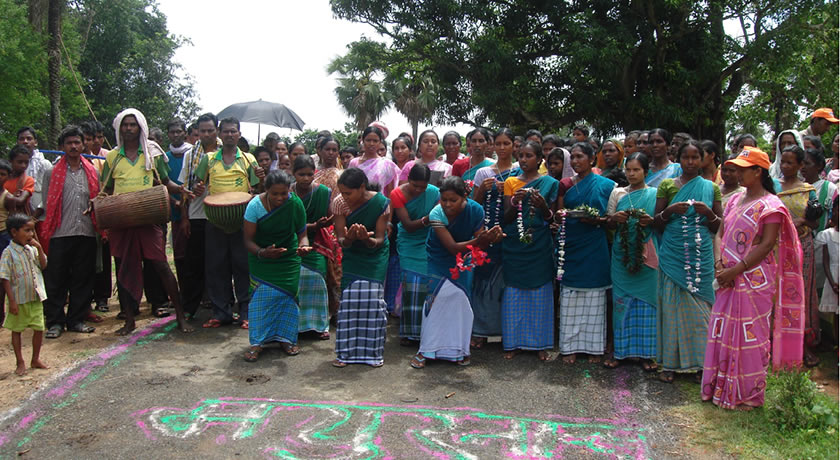 |
| Traditional Santhali style dance and songs were adapted to showcase sanitation and hygiene practices in Jharkhand. |
 |
| Promoting Sustainable Sanitation in Rural India: Taking Stock |
|
The CEE North East team from Assam participated in the review meeting of the Promoting Sustainable Sanitation in Rural India project. The project aims at making Behali Block in Sonitpur District of Assam Open Defecation Free (ODF). The Block has 90 Villages under 9 Gram Panchayats (GP) including 300 habitations with 12788 households and a population of about one lakh.
CEE North East is a Sub-Grantee of the project which is supported by the UN Global Sanitation Fund. The After Action Review Meet was conducted by NR Management Consultants India Private Limited at Madhupur in Jharkhand, on July 10-11. The main agenda was a programmatic reflection on the achievements and outcomes of the preceding quarter.
Site visits to some of the villages which have attained ODF status through the adoption of sanitary toilets by the communities (especially in Buchayam village of Barmasia GP under Shikaripara Block ; Mayurnacha Village of Bartali GP under Dumka Block; and Jaipahari Village of Bartali GP under Dumka Block in Jharkhand) provided the participants of the Review Meet, as well as the field teams with an idea about the process and factors that have contributed to the success of the project.
The villages identify areas requiring sanitation and hygiene improvements and they themselves develop low cost urinals (with their own resources) which are both affordable and appropriate to their local context. While the approach does allow for local innovation in the choice of material design and technology for toilet construction, the simplicity of the standard design, and the fact that it was developed in the villages by the communities themselves, have been significant factors for the success.
The exposure gave the participants an opportunity to understand how villages currently manage change, what they aspire to do, and invest in finding locally-appropriate solutions. The learning from this exposure tour can help to scale-up the ODF intervention up to the block level in the districts of Assam.
40 participants representing all the Sub-Grantees from Assam, Bihar and Jharkhand attended the Review Meet. CEE North East was represented by Dr. Abdhesh Gangwar, Programme Director, Mr. Pradeep Boro, Associate Programme Officer, and
Mr. Dharani Saikia, Project Officer.
Dr. Cheeranjeev Kakoti of North East Society for the Promotion of Youth and Masses,Guwahati also joined the team. |
|
|
|
 |
CEE is the ENVIS centre on Environmental Education (EE). As an ENVIS centre, CEE caters to the information needs of environmental educators. Write to the CEE ENVIS Centre at [email protected]
|
 |
|
 |
 |
This message is sent to you by Centre for Environment Education, Thaltej Tekra, Ahmedabad, India and delivered by [email protected]
© CEE 2013 Editorial team: Mamata Pandya, Carol Dsouza, Design: Pankaj Gorana |
|
|
|